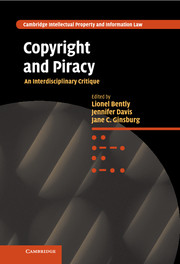Book contents
- Frontmatter
- Contents
- Notes on the contributors
- Editors' preface
- Table of cases
- Table of statutes
- Part I Introduction
- Part II History
- 2 Nineteenth-century Anglo–US copyright relations: the language of piracy versus the moral high ground
- 3 Language, practice, and history
- Part III Comparative Law
- Part IV Economics
- Part V Linguistics
- Part VI Computer software
- Part VII Information studies
- Part VIII Literature
- Part IX Art
- Part X Sociology/music
- Part XI Criminology
- Bibliography
- Index
2 - Nineteenth-century Anglo–US copyright relations: the language of piracy versus the moral high ground
from Part II - History
Published online by Cambridge University Press: 17 November 2010
- Frontmatter
- Contents
- Notes on the contributors
- Editors' preface
- Table of cases
- Table of statutes
- Part I Introduction
- Part II History
- 2 Nineteenth-century Anglo–US copyright relations: the language of piracy versus the moral high ground
- 3 Language, practice, and history
- Part III Comparative Law
- Part IV Economics
- Part V Linguistics
- Part VI Computer software
- Part VII Information studies
- Part VIII Literature
- Part IX Art
- Part X Sociology/music
- Part XI Criminology
- Bibliography
- Index
Summary
Piracy, Piracy, they cry'd aloud, What made you print my Copy, Sir, says one, You're a meer Knave, ‘tis very basely done.
America did not grant international copyright until 1891. As a result, for most of the nineteenth century, foreign works could be published in America, freely and quite legally, without permission or payment. Given the immense size of the market at stake, it is small wonder that foreign authors and publishers protested. Dickens' notorious intervention in the campaign for international copyright is often presented as if it offered a synoptic view of a pitched battle between two sides; with the righteous British on one side of the Atlantic, and the piratical Americans on the other. Such an image offers a dangerously unfair and one-sided portrait. The true picture alters significantly during the nineteenth century. In particular, possession of the moral high ground does not rest unfailingly with the British. Both sides merit the ‘pirate’ badge, in different degrees at different times.
America began the nineteenth century as a very young nation, as yet uncertain where independence from Britain would lead. Britain, similarly, had to come to terms with significant political changes affecting its sense of nationhood, and its relationships with other nations. The influence of these wide questions can be seen in the debates regarding copyright. International copyright (or its absence) came to be perceived and portrayed as linked to a nation's sense of identity and moral standing.
- Type
- Chapter
- Information
- Copyright and PiracyAn Interdisciplinary Critique, pp. 19 - 43Publisher: Cambridge University PressPrint publication year: 2010
- 2
- Cited by



